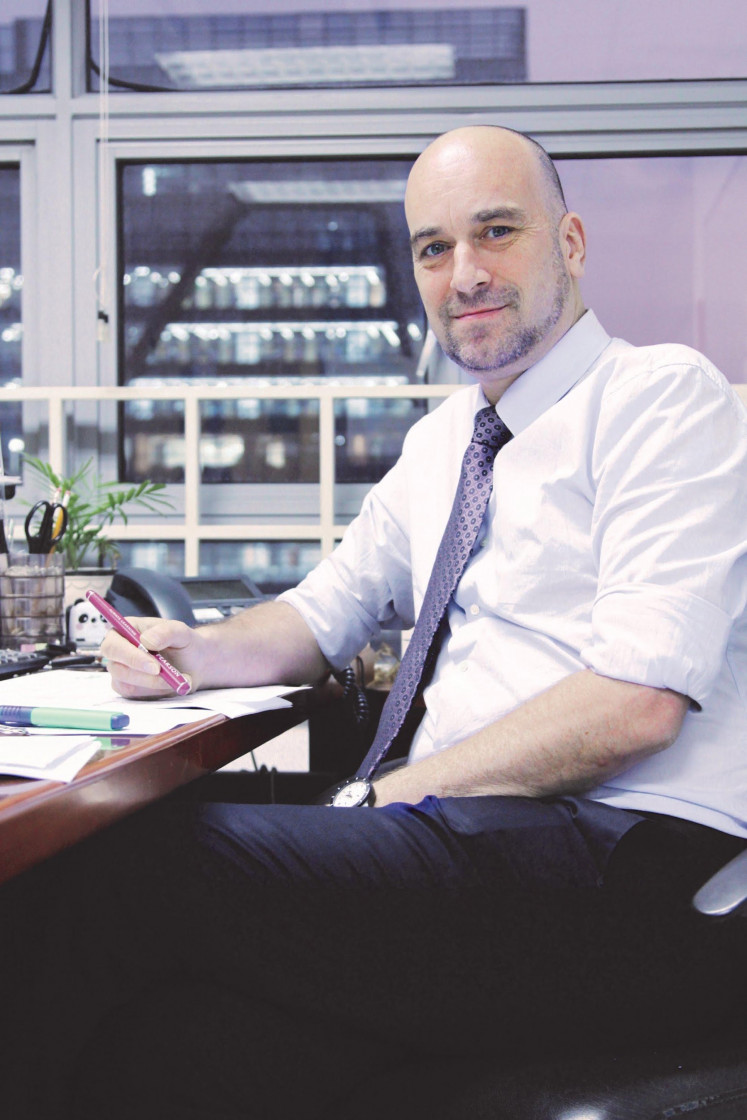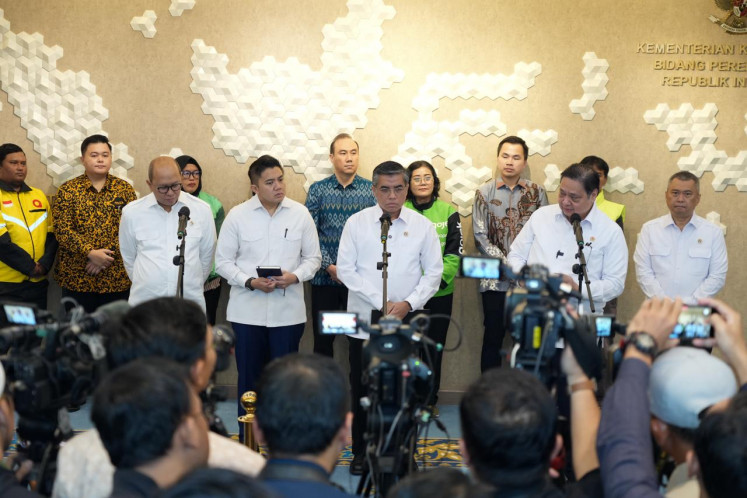Popular Reads
Top Results
Can't find what you're looking for?
View all search resultsPopular Reads
Top Results
Can't find what you're looking for?
View all search resultsStrong university academics, practical skills ensure future graduates’ readiness
Technology trends are developing so rapidly that traditional methods of education can no longer keep up. Industries want graduates with not only strong academic
Change text size
Gift Premium Articles
to Anyone
X
i’an Jiaotong-Liverpool University’s Entrepreneur College (Taicang) instils an entrepreneurial, innovative mindset to prepare students for new technology-driven changes.
With a future that experts say will be marked by change and uncertainty, today’s students must take more care than ever in choosing a university.
Technology trends are developing so rapidly that traditional methods of education can no longer keep up. Industries want graduates with not only strong academic backgrounds, but also practical skills. Increasing internationalisation means that a global outlook is critical.
In Indonesia, graduates must be prepared to enter the workforce in a country with a rapidly growing digital economy.
At the ASEAN-US Special Summit in May, President Joko Widodo said Indonesia’s digital economy was forecast to grow 20 percent per year to reach up to US$146 billion by 2025. He also revealed that Indonesia had 2,346 start-ups at the time of the summit, with the figure still growing.
Indonesia has the fifth-largest number of start-ups worldwide, two of which are valued at over US$10 billion (decacorns) and eight valued at over US$1 billion (unicorns).
XJTLU Entrepreneur College (Taicang) at Xi’an Jiaotong-Liverpool University prepares students from around the world to meet challenges brought about by rapid developments in new technologies. Students can study programmes in fields like artificial intelligence (AI), big data, intelligent manufacturing engineering, internet of things, intelligent supply chain, cultural technology, microelectronic science and engineering, and intelligent robotics. All programmes are developed in tandem with industrial partners, including Eolane Group, Bosch, Haier Group, Sugon, ECOVACS, Deep Blue Technology, Bank of China, Siasun, HeJian Technology Corporation, Shanghai Institute of Microsystem and Information Technology, China Cultural Media Group, AMT Group China, and iFLYTEK.
To provide practical experience, the undergraduate programmes include 600 hours of professional development in the form of company visits, talks by industry leaders, group work to solve real industry problems, and internship opportunities.
Meeting employers’ needs
Prof. Stuart Perrin, associate principal of the College, says that according to the most recent Future of Jobs Report from the World Economic Forum (WEF), the most desirable skills will be transferable skills such as critical analysis, active learning, adaptability and solution-finding.
The WEF report also highlighted current and future employment needs for the digital economy, cloud computing, AI, big data and robotics.
“Whether our student goes on to start a company or becomes an employee innovator, these are exactly the traits and the mindset that the College fosters.
“We are preparing students for all of this and more.”
Cleopatra Clementina, who is studying virtually at the College’s BSc Intelligent Supply Chain with Contemporary Entrepreneurialism programme from Indonesia, says the ability to interact with industry and to be exposed to real-life problem-solving attracted her to enrol.
“XJTLU’s Syntegrative Education model, which is like a collaboration between the University and their industry partners, caught my attention. This way of teaching bridges the gap between students, businesses and the community or society at large,” she says.
Prof. Perrin says that Syntegrative Education aims to benefit society through creating equal partnerships among university, industry and government.
“This educational model joins these players’ intellectual capital and social resources to create degree programmes that will prepare graduates to solve important societal problems now and in the future,” he says. “XJTLU doesn’t just talk about creating an equal education-industry partnership. We’ve already established it, to the benefit of our students.
“Each of our College’s schools was founded together with well-known industries. These industries partner with schools to determine what degrees should be created, ensure that the content is relevant to meet today’s needs and cooperate in developing teaching materials. They help us deliver education through in-campus companies and are the sources of the real industry problems our students will solve as part of their learning.”
Growing students’ minds
Residential area at Xi'an Jiaotong-Liverpool University (XJTLU) Entrepreneur College (Taicang)Adrian Heng Hwa Onn, a second-year student from Malaysia studying BEng Data Science and Big Data Technology with Contemporary Entrepreneurialism, says the College has opened his eyes to new ways of doing business.
“One module that I found particularly interesting was Futurology and Business Opportunities, offered by the Entrepreneurship & Enterprise Hub (ENT). I had the opportunity to learn about future business models. The ENT courses are combined with AI and big data, and I learned how to develop business by leveraging technologies.”
He also says his Chinese skills have expanded.
“Before, my Chinese was very rudimentary. Now I can understand most conversations because our courses have various group projects. I worked with Chinese students, and we met and discussed on campus. I think the language skill will be very helpful if I want to work in an international company in the future.”
Undergraduates at the College receive two degrees: one from the University of Liverpool in the UK and one from XJTLU that is recognised in China and internationally. All the College’s undergraduate degrees include a minor in Contemporary Entrepreneurialism.
The College’s programmes must meet rigorous academic standards, preparing students to meet the expectations of top postgraduate programmes around the world.
Bringing ideas to market
Professor Stuart Perrin, Associate Principal of Xi'an Jiaotong-Liverpool University (XJTLU) Entrepreneur College (Taicang)The College itself has a new master’s degree in entrepreneurship and innovation that offers both full- and part-time learning options.
The MSc Entrepreneurship and Innovation programme stimulates students to acquire an entrepreneurial mindset, whether they want to become entrepreneurs and start their own businesses or be intrapreneurs and lead innovations within companies.
“Students learn to identify new, innovative, and entrepreneurial opportunities, assess their potential, and bring ideas to the market in many possible forms,” says programme director Dr. Shu-Hsiang (Ava) Chen.
She says within the programme, students develop and maximise their managerial and leadership skills, including managing multi-disciplinary teams in innovative contexts. Students put theory into practice in the programme, either through creating their own business venture, or through working on their innovative project within a business in their chosen track.
“We guide students through the development, from a general idea to a potential start-up or corporate-based project,” she says.
The highly flexible master’s programme provides seven different pathway options for learning: business; the circular economy; creative technology; enterprise governance, innovation and succession; financial technology (fintech); smart cities; and technology transfer management.
In each pathway, students will receive academic support from highly experienced XJTLU staff with a variety of competencies, and business support and advice from handpicked industry mentors.
For some of the pathways, international students enrolling for the 2022-2023 academic year who cannot yet enter China will be able to start their studies online.
A campus for innovation
This summer, the College will move into a new campus in the High Tech Development zone of Taicang, one of China’s most developed county-level cities. Located on the edge of Shanghai, the city receives foreign investment from the United States, Germany and Japan, as well as support from across China, including Taiwan and Hong Kong. Major international corporations with operations in Taicang include ExxonMobil, Bosch and P&G.
Taicang is the top foreign trade port on the Yangtze River. The city boasts approximately 400 German enterprises and enjoys close industrial ties with Shanghai.
To learn more about XJTLU Entrepreneur College (Taicang) and its innovative programmes, visit













